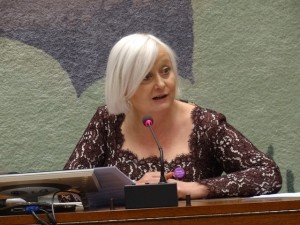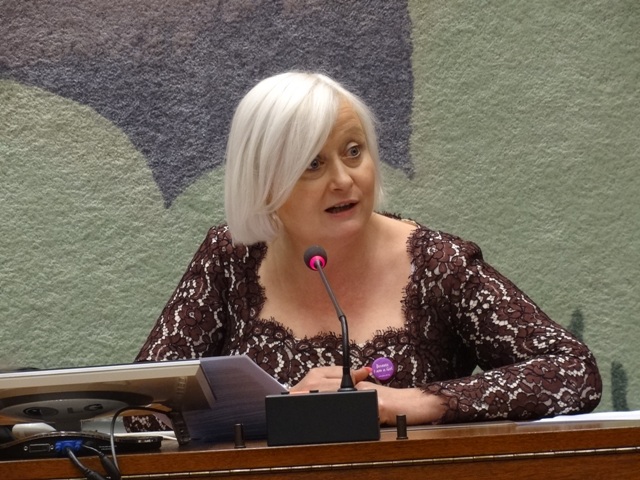 |
| Siobhain McDonagh: What is happening to women in fformer war zone is not acceptable |
Facing life after the war in Sri Lanka by Siobhain McDonagh, Member of Parliament (UK) @ UNHRC on 11.03, 2013
Ladies and Gentlemen. Invited dignitaries and guests. Friends.
I am very grateful to have been given the opportunity to speak at today’s event.
I never thought, when I became a British Member of Parliament for my constituency of Mitcham & Morden in 1997, that I would at some stage be addressing a UN Human Rights Council meeting in Geneva, on the plight of Tamil women in North Sri Lanka.
However, the situation of the Tamils on the island is now one that is very close to my heart. It is because of the Tamil community in my constituency that I became involved in the Tamil cause. The information that I have received from them, particularly the horror stories described from the final months of the armed conflict in 2008/2009, have had a lasting effect on me.
Yet the human rights violations of Tamils did not stop when the war ended. The culture of impunity on the island has meant that the rights of Tamil men and women, and indeed those of many others who stand up to the Rajapaksa regime, are dishonoured and abused to this day.
On Friday 8th March, we celebrated International Women’s Day.
A time not only to celebrate the contribution of women to social, political, cultural and domestic life in all countries around the world, but also to serve as an important reminder that in many places the fundamental rights of so many women are still at risk.
This year’s United Nations International Women’s Day theme is ‘A promise is a promise: Time for action to end violence against women’.
One such country where promises are made but easily broken is Sri Lanka.
In May 2009, a mere matter of days following the brutal end of the armed conflict, President Rajapaksa gave a set of public assurances to the UN Secretary-General.
the economic and political empowerment of the Tamil majority north and east of the island would be secured;
work would get underway to build a lasting political settlement;
t he promotion and protection of human rights would be a priority;
and measures would be taken to address the violations of international humanitarian and human rights law during the war.
However in the almost four years since that statement was made, those promises have not been fulfilled.
It should come as no surprise, therefore, that similar such assurances to combat violence against women in Sri Lanka, particularly those in the former conflict areas of the North and East, have been broken too.
At the UN review of Sri Lanka’s human rights record in November 2012, the Sri Lankan delegation claimed that the ‘protection of women and advancement of their rights has been a cornerstone of Government policy in the post-conflict phase’.
However it is impossible to take the Government of Sri Lanka at its word. Gender based violence was used as a weapon of war.
The Sri Lanka’s Killing Fields documentary series has provided compelling evidence of war crimes and crimes against humanity committed during the conflict. I am so pleased that Callum Macrae and his team have been able to preview their latest film, ‘No Fire Zone’, in Geneva, in spite of the protests from Sri Lanka.
The images shown in these documentaries are among the most harrowing ever to appear on screen and included footage of dead female Tamil combatants and others who appear to have been sexually abused and then murdered by the State security forces.
In the months following the end of the armed conflict, over 300,000 people were herded into internal displacement camps.
Numerous reports emerged of the intimidation, harassment and sexual abuse committed against women whilst there. ‘The Australian’ newspaper was just one of a number of media organisations, who reported on the creation of prostitution rings “run by officials” within IDP camps.
However the vulnerability of women was not only confined within these camps, but has become a predominant feature in the lives of women.
Given the extensive loss of life in the final months of the armed conflict alone, which resulted in the deaths of tens of thousands of civilians, with many more unaccounted for, there are up to 90,000 war widows heading up households in the region.
Since May 2009, the north and east have been militarised by the State.
The militarisation of the region may suggest an increased level of security for the inhabitants.
However the reverse has been true.
The current environment has posed a particular threat to the many Tamil female headed family households.
Although the military camps are closed, many people have been unable to return to their lands, houses and livelihoods. Relief aid to these people is unreliable, and the displaced women have arrived back, often with no assets or limited skills. The atmosphere of occupation by the army has made it all but impossible for the Tamil community to provide services.
In September 2012, India’s ‘Hindu’ newspaper reported an “overwhelming presence” of the military, with the Sri Lankan army “deploying 16 out of its 19 divisions in the Tamil-dominated regions”. Through its vast network of checkpoints, between and within villages and towns, the security services are able to restrict the movement of residents and monitor their activities.
Tamil women are, therefore, forced to negotiate their lives with the soldiers in the region – and are subject to regular abuse. According to the International Crisis Group, “women in Sri Lanka’s predominantly Tamil-speaking north and east are facing a desperate lack of security in the aftermath of the long civil war. […]The fact that women must rely on the military for everyday needs not only puts them at greater risk of gender-based violence, but also prevents them from building their own capacity within communities”.
Whilst the Government of Sri Lanka has said that ‘any correlation between military presence and sexual violence is unfounded’, credible reports from governments, international human rights organisations and representatives of the Tamil people in Sri Lanka state otherwise.
The Tamil National Alliance (TNA) has reported on the “increasing number of sexual assaults carried out against women and girls in the Jaffna, Mullaitivu and Kilinochchi districts, often by government officials and the military. The brutality with which these assaults are carried out is especially disturbing”.
The UK’s High Commissioner to Sri Lanka, Mr John Rankin, has “discussed rising crime rates for violence against women with the police in these regions and more generally”.
And according to the European Centre for Constitutional and Human Rights, “the fact that the military are increasingly taking over police duties, meaning that women and girls would have to address complaints directly to the perpetrators […] [they, therefore] avoid speaking out due to fear of stigmatization, threats and possible further attacks”.
The high number of female headed households and the restricted livelihood opportunities open to women – due in large part to the military’s involvement in economic activities – means that “prostitution and the emergence of brothels [are] on the increase in the Vanni […with] the primary clientele compris[ing] both local men and the military”. ‘Sri Lanka Brief’ have stated in their latest human rights report.
Tamil women have also been coerced into joining the armed forces. Young women from female-headed families or families with five or more members have been targeted, falsely informed that they would be engaging in clerical work and then taken to military camps for training, not being allowed to leave.
This is unacceptable.
At least 20 recent, forced recruits, many of whom were unconscious, were admitted to Kilinochchi district hospital in December 2012 and no-one was allowed to meet them whilst they were there, including family, friends and representatives from the TNA.
As the Women’s Action Network (WAN), a collective of 11 women’s groups from the North and the East, stated at the time “this situation raises grave concerns regarding the role of the state and the military in the lives of women, […] and the continued security of these women while in service”.
International Crisis Group has said previously that “the international response to women’s insecurity [in Sri Lanka] has been unnecessarily muted”.
With international NGOs unable to freely monitor the situation and treatment of women in the North and East, due to restrictions imposed by the Government and security forces, the true scale of abuse, destitution and desperation suffered by women in the region is very difficult to assess.
However, the evidence of abuses described, as well as the findings from Human Rights Watch most recent report, which details sexual violence against Tamil women and men by Sri Lankan security forces in detention centres, serves to highlight why it is incumbent upon the international community and the United Nations in particular to speak out about what is happening in Sri Lanka.
As the International Women’s Day states, it is time for action to end violence against women.
Therefore, it is most certainly time that Sri Lanka is held to account for its actions and made to live up its international obligations to end state sanctioned gender based violence.
To that end, I call on the Government of Sri Lanka to do the following:
Promote and protect women’s rights;
Take concrete actions to end gender based violence;
Cease and desist the coercion of Tamil women into the military;
Demilitarise the Tamil majority areas; restore complete civil administration to all militarised government departments; and ensure that the military desist from involvement in any economic activities which undermine the livelihood opportunities for inhabitants, particularly women, in Tamil areas.
I also urge the Government to support the UN Women’s Initiative, which is calling on Governments everywhere to COMMIT to end violence against women and girls.
However, if history has told us anything, then the Government are unlikely to do any of these things willingly.
Therefore, I feel it is imperative that the international community, including the United Nations and particularly this Council, must:
Remain seized of the situation in Sri Lanka
Call for the demilitarisation of Tamil majority areas;
ask the UN country team in Sri Lanka to monitor the ground realities for women the north and east;
AND be prepared to speak out against all cases of gender-based violence and gender inequalities in Sri Lanka.
In addition, I urge all of you to support the establishment of international, independent war crimes investigation in Sri Lanka. The creation of such a mechanism would be a crucial step in ensuring accountability, challenging the culture of impunity, and enabling reconciliation.
This would, no doubt, have a huge, positive impact on the rights of all people, particularly Tamil women, in Sri Lanka.
Thank you.
